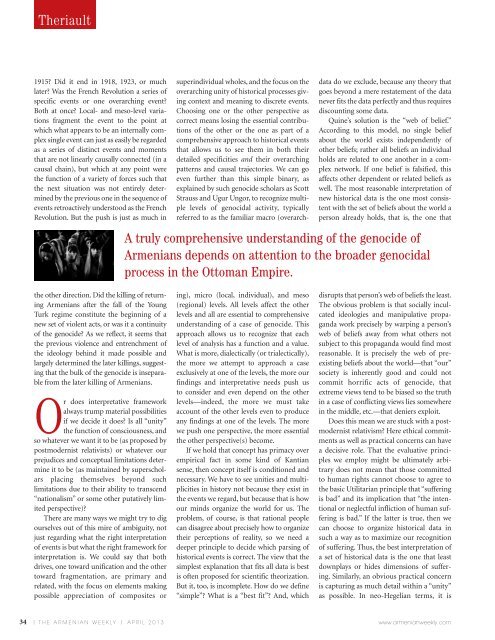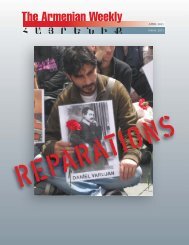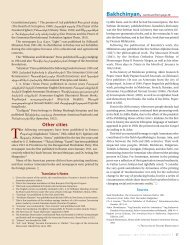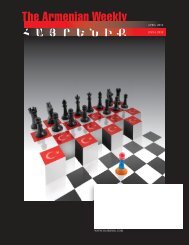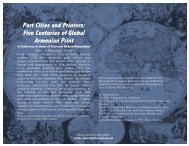Create successful ePaper yourself
Turn your PDF publications into a flip-book with our unique Google optimized e-Paper software.
Theriault<br />
1915? Did it end in 1918, 1923, or much<br />
later? Was the French Revolution a series of<br />
specific events or one overarching event?<br />
Both at once? Local- and meso-level variations<br />
fragment the event to the point at<br />
which what appears to be an internally complex<br />
single event can just as easily be regarded<br />
as a series of distinct events and moments<br />
that are not linearly causally connected (in a<br />
causal chain), but which at any point were<br />
the function of a variety of forces such that<br />
the next situation was not entirely determined<br />
by the previous one in the sequence of<br />
events retroactively understood as the French<br />
Revolution. But the push is just as much in<br />
data do we exclude, because any theory that<br />
goes beyond a mere restatement of the data<br />
never fits the data perfectly and thus requires<br />
discounting some data.<br />
Quine’s solution is the “web of belief.”<br />
According to this model, no single belief<br />
about the world exists independently of<br />
other beliefs; rather all beliefs an individual<br />
holds are related to one another in a complex<br />
network. If one belief is falsified, this<br />
affects other dependent or related beliefs as<br />
well. The most reasonable interpretation of<br />
new historical data is the one most consistent<br />
with the set of beliefs about the world a<br />
person already holds, that is, the one that<br />
A truly comprehensive understanding of the genocide of<br />
Arme nians depends on attention to the broader genocidal<br />
process in the Ottoman Empire.<br />
the other direction. Did the killing of returning<br />
<strong>Armenian</strong>s after the fall of the Young<br />
Turk regime constitute the beginning of a<br />
new set of violent acts, or was it a continuity<br />
of the genocide? As we reflect, it seems that<br />
the previous violence and entrenchment of<br />
the ideology behind it made possible and<br />
largely determined the later killings, suggesting<br />
that the bulk of the genocide is inseparable<br />
from the later killing of <strong>Armenian</strong>s.<br />
Or does interpretative framework<br />
always trump material possibilities<br />
if we decide it does? Is all “unity”<br />
the function of consciousness, and<br />
so whatever we want it to be (as proposed by<br />
postmodernist relativists) or whatever our<br />
prejudices and conceptual limitations determine<br />
it to be (as maintained by superscholars<br />
placing themselves beyond such<br />
limitations due to their ability to transcend<br />
“nationalism” or some other putatively limited<br />
perspective)?<br />
T<strong>here</strong> are many ways we might try to dig<br />
ourselves out of this mire of ambiguity, not<br />
just regarding what the right interpretation<br />
of events is but what the right framework for<br />
interpretation is. We could say that both<br />
drives, one toward unification and the other<br />
toward fragmentation, are primary and<br />
related, with the focus on elements making<br />
possible appreciation of composites or<br />
superindividual wholes, and the focus on the<br />
overarching unity of historical processes giving<br />
context and meaning to discrete events.<br />
Choosing one or the other perspective as<br />
correct means losing the essential contributions<br />
of the other or the one as part of a<br />
comprehensive approach to historical events<br />
that allows us to see them in both their<br />
detailed specificities and their overarching<br />
patterns and causal trajectories. We can go<br />
even further than this simple binary, as<br />
explained by such genocide scholars as Scott<br />
Strauss and Ugur Ungor, to recognize multiple<br />
levels of genocidal activity, typically<br />
referred to as the familiar macro (overarching),<br />
micro (local, individual), and meso<br />
(regional) levels. All levels affect the other<br />
levels and all are essential to comprehensive<br />
understanding of a case of genocide. This<br />
approach allows us to recognize that each<br />
level of analysis has a function and a value.<br />
What is more, dialectically (or trialectically),<br />
the more we attempt to approach a case<br />
exclusively at one of the levels, the more our<br />
findings and interpretative needs push us<br />
to consider and even depend on the other<br />
levels—indeed, the more we must take<br />
account of the other levels even to produce<br />
any findings at one of the levels. The more<br />
we push one perspective, the more essential<br />
the other perspective(s) become.<br />
If we hold that concept has primacy over<br />
empirical fact in some kind of Kantian<br />
sense, then concept itself is conditioned and<br />
necessary. We have to see unities and multiplicities<br />
in history not because they exist in<br />
the events we regard, but because that is how<br />
our minds organize the world for us. The<br />
problem, of course, is that rational people<br />
can disagree about precisely how to organize<br />
their perceptions of reality, so we need a<br />
deeper principle to decide which parsing of<br />
historical events is correct. The view that the<br />
simplest explanation that fits all data is best<br />
is often proposed for scientific theorization.<br />
But it, too, is incomplete. How do we define<br />
“simple”? What is a “best fit”? And, which<br />
disrupts that person’s web of beliefs the least.<br />
The obvious problem is that socially inculcated<br />
ideologies and manipulative propaganda<br />
work precisely by warping a person’s<br />
web of beliefs away from what others not<br />
subject to this propaganda would find most<br />
reasonable. It is precisely the web of preexisting<br />
beliefs about the world—that “our”<br />
society is in<strong>here</strong>ntly good and could not<br />
commit horrific acts of genocide, that<br />
extreme views tend to be biased so the truth<br />
in a case of conflicting views lies somew<strong>here</strong><br />
in the middle, etc.—that deniers exploit.<br />
Does this mean we are stuck with a postmodernist<br />
relativism? Here ethical commitments<br />
as well as practical concerns can have<br />
a decisive role. That the evaluative principles<br />
we employ might be ultimately arbitrary<br />
does not mean that those committed<br />
to human rights cannot choose to agree to<br />
the basic Utilitarian principle that “suffering<br />
is bad” and its implication that “the intentional<br />
or neglectful infliction of human suffering<br />
is bad.” If the latter is true, then we<br />
can choose to organize historical data in<br />
such a way as to maximize our recognition<br />
of suffering. Thus, the best interpretation of<br />
a set of historical data is the one that least<br />
downplays or hides dimensions of suffering.<br />
Similarly, an obvious practical concern<br />
is capturing as much detail within a “unity”<br />
as possible. In neo-Hegelian terms, it is<br />
34 | THE ARMENIAN WEEKLY | APRIL 2013<br />
www.armenianweekly.com


